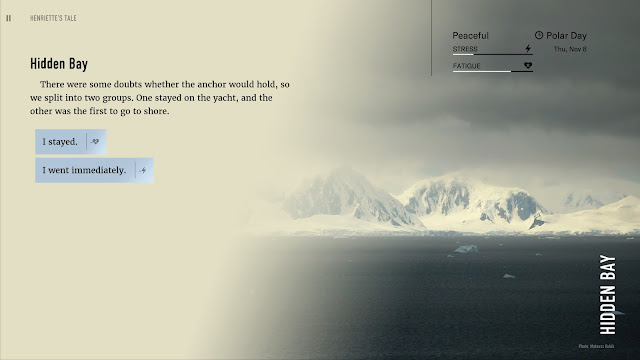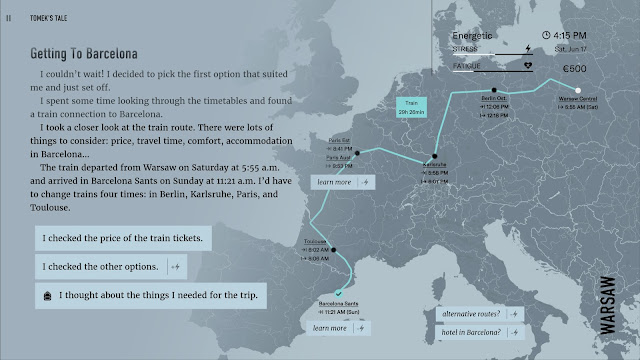Review by Matt S.
Almost every visual novel aims to present players with a fantasy – it may well be located in a real world location (Stein’s;Gate’s Akihabara, Root Letter’s Shimane prefecture), but the stories that they share are complete flights of fancy. Wanderlust: Travel Stories is a little different; it’s a visual novel that blurs the distinction between video game and travel journalism, and it’s a fascinating, beautiful little thought experiment.
Being upfront here: while the developers of Wanderlust claim that the stories depicted in the game are based on real-world stories, and are “meticulously researched”, it’s hard to tell just how authentic they are as travel writing. They present themselves in the format, and certainly paint a vivid picture of landscapes, cultures, and events, but there’s also nothing that explicitly states that these are stories that were experienced by a specific person.
This does hurt the game’s premise a little. The power of travel journalism is that it is fundamentally non-fiction in design. Every writer will have their own creative spin and interpretation of events, and every story is at the mercy of memory, whether notes were jotted down immediately, or after the fact, but nonetheless travel writing works on the premise that the real world is an exciting place to explore, and the real stories that are there to share are every bit as interesting as the most wild fantasy.
By not making it clear just how real these stories are, or whether they’re an amalgamation of many people’s experiences, Wanderlust’s biggest problem is it’s difficult to “read” most of what it depicts as honest. The photos that accompany the text are gorgeous, and certainly right up there with the best travel photojournalism I’ve ever seen, but they’re also drawn from a large number of different people, and those people are different to those telling the stories. Combined with the uncertainty around the text, makes the authenticity of Wanderlust as travel journalism too uncertain for its own good.
With all of that being said, it is meticulously researched, and each snippet of a story comes from somewhere. Two women meet in an airport – one trades a copy of an Anaïs Nin book to another… and that’s an author that’s far too obscure for the anecdote to not be someone’s. It’s those little touches that give the stories presented in Wanderlust a resonance and richness, which makes them compelling to read through, even if the links between moments in time aren’t always as clean as you’d like. The structure of each story – as snippets told of experiences along the way – does leave a number of blanks for the reader, with no real way to fill them in. With that being said I’m not entirely sure I dislike this approach; as an experience it feels like a serialised story told over a number of issues in a travel magazine, and there’s a kind of appeal in that.
The journeys that you follow take you all over the world, from Antarctica to Asia and on to Africa. Modern travel journalism delights in taking readers off the beaten track, to places that they’re unlikely to be able to travel themselves, and find the little (but appealing in one way or another) moments of culture shock along the way. There’s certainly an element of old-style imperialism in that, and certainly in Wanderlust there’s a dash of an exoticism to it, but on the other hand these stories are so much more interesting than yet another dash through Europe or America, so I was glad to see that for the most part Wanderlast wasn’t interested in playing it safe in terms of where it takes players (of course, there are stories in “the west,” and those, too, involve the exotic moments such as long train rides… but those stories are just not as stand out as the ones that go to really different places).
It all starts on Easter Island, as a bunch of travelers have a serendipitous meeting in a pub. The start trading stories, and that’s where the interactivity sets in, as you choose what story to follow first. While within each story you get to make some basic decisions, which seem to have a simple (but eventually superficial) affect on the overall running of the plot. You also need to manage some basic statistics at points, like stress and fatigue, as well as monitor the storyteller’s money.
In all honesty, I don’t understand why the development team added those mechanics. It feels like they’re there in a bid to put “gameplay” into the thing, rather than any genuine desire to give players statistics to monitor. Regardless of the design doc reason, the presence of this stuff is largely unnecessary and superficial, and that’s disappointing, since having a more natural flow through the story with basic decision trees would have suited the minimalist vibe that the developer is aiming for far better. I know that developers often feel this tension to include mechanics to save themselves from people dismissing the game as not being interactive enough, but throwing half-hearted features in there aren’t helping the cause either.
One thing Wanderlust really has going for it is as an educational piece. Between the writing and photography it’s impossible to walk away from this game and not want to research some of the things you read and see further. Whether it’s what it’s like camped out on a barge traveling up a river in central Africa, life in Thailand, or what the tourism scene is like on Easter Island, there’s quite a lot in there that might inspire your own travels. There are so many cultural items, locations, people and concepts mentioned, too, that I recommend playing with a notepad handy so you can indulge some further reading once away from the game.
Ultimately, Wanderlust succeeds in being an inspirational work about the power of travel. Stories are told, friends are made, and unforgettable experiences shared. It’s not quite as honest as I would like from genuine travel journalism – I like to be sure the stories I read around the world belong to someone that I can identify with – but that’s the minor griping of someone who is far too passionate about travel and travel writing. If this game inspires someone to book a ticket to Bangkok, Brazzaville, or anything in-between, then this game is an objective good to humanity. We could all stand to learn about the world outside of our circles.
– Matt S.
Editor-in-Chief
Find me on Twitter: @mattsainsb











